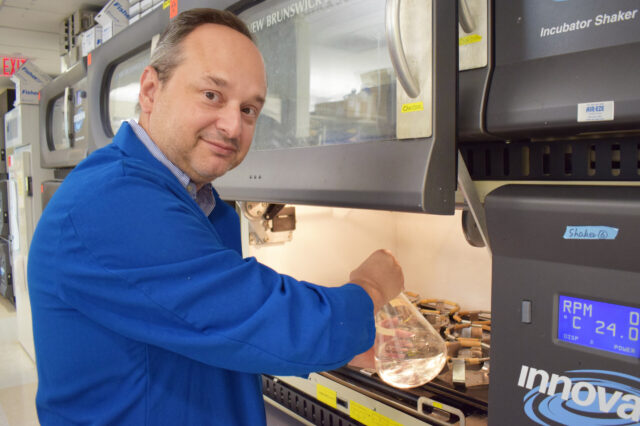New scientist takes aim at TB, the world’s deadliest infectious disease

JUPITER, Fla. — Luiz Pedro Carvalho, Ph.D., is on a quest to find new medicines for treatment-resistant diseases, including tuberculosis, which is again the world’s deadliest infectious disease, after briefly falling behind COVID-19.
Carvalho is the newest faculty member to join The Herbert Wertheim UF Scripps Institute for Biomedical Innovation & Technology as a professor of chemistry. His research focuses on bacteria from the genus Mycobacterium, which not only causes tuberculosis, but other global scourges, including leprosy. His research group works to define how soil-dwelling and waterborne mycobacteria have changed over the past 50 million years to allow them to infect humans and optimize their growth and virulence.
M. tuberculosis is a cunning and dangerous germ. It often infects the lungs, and can be latent for years, leaving no symptoms until it reemerges to cause prolonged, severe illness. Tuberculosis kills more than 1.6 million people a year globally, and multidrug resistance has become a major crisis, the World Health Organization says. Treatments for the disease have many side effects and must be taken for six to 24 months, contributing to poor patient adherence and drug resistance.
Carvalho’s work has focused on understanding the metabolism of the germ, and the biochemistry and mechanisms of drug resistance. That will be the key to defeating it, he said.“Once we have an understanding of what has happened at the cellular and molecular levels, we will use state-of-the-art methods available here at The Wertheim UF Scripps Institute, and at other locations, to inform the discovery and development of novel medications capable of killing these pathogens and transforming treatment regimens,” Carvalho said.
Prior to joining The Wertheim UF Scripps Institute, Carvalho was a principal group leader at the Francis Crick Institute in London and still serves as a visiting group leader. He earned his doctorate in biochemistry from the Albert Einstein College of Medicine in New York City, and his Master of Science degree in cell and molecular biology, as well as his pharmacy degree, from the Federal University of Rio Grande do Sul in Porto Alegre, Brazil.
His work has been recognized throughout the world, as he has earned the American Chemical Society’s Infectious Diseases/Biological Chemistry Division Young Investigator Award; the Horizon Award (a group effort, including two lab members) from the Royal Society of Chemistry, the Irving S. Sigal Memorial Award from the American Society for Microbiology and the MRC Centenary Early Career Award from the Medical Research Council.
Patrick Griffin, Ph.D., scientific director of the institute, said Carvalho is an outstanding addition to The Werthiem UF Scripps Institute’s faculty.
“Dr. Carvalho’s discoveries about fundamental aspects of the tuberculosis pathogen’s biochemistry and metabolism are expanding our understanding of this global threat, which is a key step in fighting this very challenging infectious disease,” Griffin said. “The world needs more tools in its arsenal to fight mycobacterial diseases. We have unique assets and expertise at The Wertheim UF Scripps Institute that, combined with Dr. Carvalho’s proficiency, could make a world of difference.”